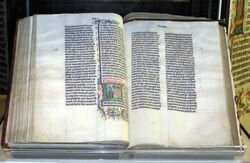 Theological Dictionary word of the day: timeline of Christianity
Theological Dictionary word of the day: timeline of ChristianityThe purpose of this chronology is to give a detailed account of Christianity from the beginning of the current era to the present. Question marks on dates indicate approximate dates. For "Old Testament" chronology, see History of ancient Israel.
Era of Jesus
The year one is the first year in the Christian calendar (there is no year zero), which is the calendar presently used (in unison with the Gregorian calendar) almost everywhere in the world, because of the current dominance of the Western world. Traditionally, this was held to be the year Jesus was born, however most modern scholars argue for an earlier date and later dates, the most agreed upon being between 6 B.C. and 4 B.C.
More...




